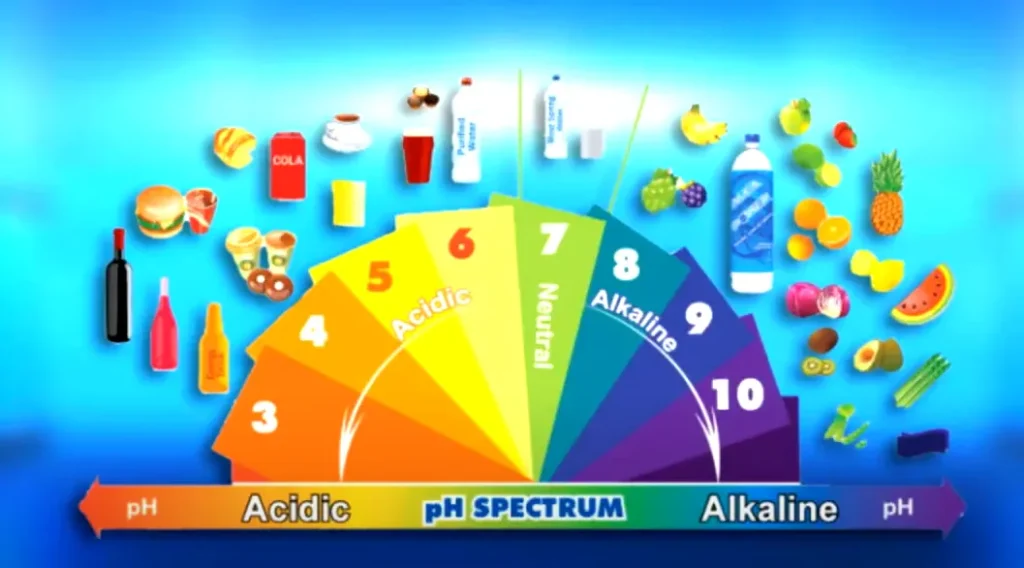Are you ready to take control of your health?
Discover the power of the alkaline diet.
With this approach, you can optimize your well-being by balancing the pH levels in your blood through the foods you eat.
In this article, we’ll break down the science behind the alkaline diet, explore its potential benefits, and discuss how to get started.
So, if you’re curious about enhancing your health through nutrition, keep reading to unlock the secrets of the alkaline diet.
What Is the Alkaline Diet?

If you’re curious about the alkaline diet, it is important to understand what it entails and how it can potentially impact your health.
The alkaline diet is based on the belief that the foods we eat can affect the pH balance of our blood.
Advocates of this diet claim that consuming alkaline-forming foods can lead to numerous health benefits, including weight loss, improved digestion, healthier skin, increased energy levels, reduced inflammation, and enhanced exercise performance.
However, it is essential to separate fact from fiction when it comes to the alkaline diet.
While some people believe that acidic foods can lead to health problems and that non acidic foods can restore balance, there is limited scientific evidence to support these claims.
The body has natural mechanisms in place to regulate pH levels, and the impact of dietary changes on blood pH is minimal.
That being said, this diet does encourage healthy eating patterns by emphasizing plant-based foods and limiting the intake of red meat and refined grains.
Additionally, consuming a diet rich in non acidic fruits, vegetables, and whole grains can provide essential nutrients and antioxidants that support energy levels, reduce inflammation, and optimize exercise performance.
While the alkaline diet may have some potential benefits, it is always important to maintain a balanced and varied diet that meets your individual nutritional needs.
Consulting with a healthcare professional or registered dietitian can help you make informed decisions about your dietary choices.
The Science Behind Alkaline Diets

To understand the science behind alkaline diets, it is important to explore how dietary choices can impact the body’s pH balance.
Here are some key points to consider:
- Acid-Base Homeostasis: The body maintains a delicate balance between acidity and alkalinity, known as acid-base homeostasis. This balance is crucial for optimal health and proper functioning of bodily systems.
- Urine pH: Some proponents of the alkaline diet suggest monitoring urine pH as a reflection of overall body pH. However, urine pH is not a reliable indicator of general health or pH balance throughout the body.
- Bone Health: The acid-ash hypothesis proposes that acid-forming diets contribute to bone loss and osteoporosis. However, scientific evidence linking dietary acid to bone density or fracture risk is inconclusive.
- Cancer Prevention: The alkaline diet is sometimes claimed to prevent or treat cancer by creating an alkaline environment in the body. However, there is no direct evidence supporting this claim, and cancer cells can thrive in both acidic and alkaline environments.
- Ancestral Diets: Some research suggests that ancestral diets were predominantly alkaline, while others indicate a mix of alkaline and acid-forming foods. However, the connection between ancestral diets and modern disease is complex and multifactorial.
Potential Health Benefits of An Alkaline Diet
Continuing the discussion from the previous subtopic, let’s explore the potential benefits of alkaline diets.

While there is limited scientific evidence specifically supporting the health benefits of alkaline diets, there are several potential advantages that have been suggested.
Improved Digestion
- Dietary Fiber: The diet’s emphasis on fruits, vegetables, and plant-based foods provides a good source of dietary fiber, crucial for healthy digestion.
- Reduced Digestive Issues: Alkaline diets are less likely to cause digestive problems like bloating and acid reflux.
Enhanced Energy Levels
- Nutrient-Dense Foods: Fruits and vegetables, staples of the alkaline diet, are rich in vitamins, minerals, and antioxidants, promoting energy production.
- Stable Energy Throughout the Day: These nutrients help maintain consistent energy levels.
Promotion of Skin Health
- Antioxidant-Rich Fruits and Vegetables: Alkaline diets protect the skin from free radical damage.
- Emphasis on Hydration: Adequate hydration is essential for maintaining healthy skin.
Support for Gut Health
- Fiber-Rich Foods: Alkaline diets support a healthy gut microbiome due to their emphasis on fiber-rich foods.
- Digestion and Nutrient Absorption: A balanced gut microbiome is crucial for proper digestion and nutrient absorption.
Weight Loss
- Emphasis on whole, unprocessed foods and the restriction of high-calorie and unhealthy options may support weight loss. However, it’s important to note that weight loss is a complex process influenced by various factors.
Anti-Inflammatory Effects
- Fruits and vegetables in the alkaline diet are rich in antioxidants and anti-inflammatory compounds, potentially reducing inflammation in the body.
Healthy Immune System
- Essential vitamins and minerals from fruits and vegetables in the alkaline diet support immune function.
- Reduced inflammation can help maintain a healthy immune system.
Detoxification
- Emphasis on whole, unprocessed foods and the exclusion of processed and unhealthy options can reduce toxin intake and promote overall health and well-being.
It is important to note that while the alkaline diet may have potential benefits, more research is needed to understand its effects on various health outcomes fully.
Additionally, it is always recommended to consult with a healthcare professional before making any significant dietary changes.
Try The Alkaline Diet With These Foods
To follow an alkaline diet, you should regularly include specific foods in your meals.
These foods are known for their alkaline-forming properties and can have various benefits for your health.

Here are five foods that are commonly recommended for an alkaline diet:
- Fruits: Incorporate a variety of fruits such as berries, citrus fruits, melons, and apples into your diet. These fruits are rich in vitamins, minerals, and antioxidants that can support overall health.
- Nonstarchy vegetables: Include a wide array of nonstarchy vegetables such as leafy greens, broccoli, cucumbers, and bell peppers. These vegetables are low in calories and high in fiber, helping with digestion and weight management.
- Almonds: Snack on almonds as they are a good source of healthy fats, protein, and fiber. They can provide sustained energy and support cardiovascular health.
- Coconut oil: Cook with coconut oil as a healthier alternative to other oils. It contains medium-chain triglycerides that can be easily digested, providing a quick source of energy.
- Almond milk: Use almond milk as a dairy-free alternative. It is low in calories and can contribute to healthy digestion and skin health.
Acid-Forming Foods to Avoid in Alkaline Diets
When following an alkaline diet, it is important to avoid certain foods that are known to be acid-forming and can disrupt the pH balance of your body.

Acid-forming foods include meat, poultry, fish, cottage cheese, milk, cheese (especially Parmesan cheese, reduced-fat cheddar, and hard cheeses), yogurt, ice cream, eggs (particularly the yolk), grains (such as brown rice, rolled oats, spaghetti, cornflakes, white rice, rye bread, and whole-wheat bread), alcohol, soda, lentils, peanuts, walnuts, and other packaged and processed foods.
These foods can increase the acidity in your body and potentially lead to health risks.
The idea behind the alkaline diet is that by consuming alkaline-forming foods, you can maintain a proper pH balance in your body.
However, the research on this diet is limited and inconclusive.
There is no scientific evidence that changing the pH of your body through diet can significantly impact your overall health.
The kidneys and lungs tightly regulate your body’s pH, and it varies in different regions of the body.
Furthermore, following a strict alkaline diet may lead to nutrient deficiencies if not properly balanced.
Some foods that are restricted on an alkaline diet, such as dairy products and whole grains, are important sources of essential nutrients like calcium and fiber.
It is crucial to ensure that your diet is well-rounded and provides all the necessary nutrients for optimal health.
Starting and Maintaining an Alkaline Food Diet

To successfully start and maintain an alkaline diet, you should prioritize incorporating alkaline-forming foods into your daily meals.
This will help support the slightly alkaline environment in your body and promote overall health and well-being.
Here are some key points to consider when starting and maintaining an alkaline diet:
- Alkaline Diet and Weight Loss: This diet may help support weight loss by promoting the consumption of nutrient-dense, low-calorie foods such as fruits and vegetables. These foods are high in fiber and can help you feel fuller for longer, reducing the likelihood of overeating.
- Alkaline Diet and Digestion: It emphasizes the consumption of fruits, vegetables, and plant-based proteins, which are rich in fiber. This can support healthy digestion by promoting regular bowel movements and preventing constipation.
- Alkaline Diet and Skin Health: A diet that is rich in alkaline-forming foods can help improve skin health. Fruits and vegetables are packed with antioxidants and vitamins that can nourish the skin and promote a healthy complexion.
- Alkaline Diet and Energy Levels: By providing your body with a steady supply of nutrient-dense foods, an alkaline diet can help boost energy levels. This can be attributed to the consumption of fruits, vegetables, and plant-based proteins, which provide essential nutrients for optimal energy production.
- Alkaline Diet and Inflammation: It has been associated with a reduced risk of chronic inflammation. This can be attributed to the consumption of anti-inflammatory foods such as fruits, vegetables, and healthy fats.
Incorporating these key points into your daily routine can help you start and maintain a diet, promoting overall health and well-being.
Alkaline Diet Recipes

One way to incorporate the principles of the alkaline diet into your daily meals is by trying out delicious and nutrient-rich diet recipes.
When planning your meals, it’s important to focus on alkaline-forming foods such as fruits, vegetables, legumes, and nuts.
These foods have a higher pH and can help balance the acidity in your body.
Some alkaline diet recipes that you can try include green smoothies made with alkaline fruits and leafy greens, roasted vegetables seasoned with alkaline spices like turmeric and ginger, quinoa salads with alkaline vegetables and herbs, and plant-based protein dishes such as lentil curry or chickpea stir-fry.
These recipes not only provide essential nutrients but also taste delicious and can help you maintain a healthy alkaline balance in your body.
Drawbacks and Considerations of Alkaline Diets
What are the potential drawbacks and considerations of following an alkaline diet?

While this has gained popularity for its potential health benefits, it is important to consider some drawbacks and myths associated with this dietary approach.
Here are five key considerations:
- Limited scientific evidence: Despite claims of its effectiveness, there is a lack of robust scientific research explicitly examining the diet. While some studies suggest that certain aspects of the diet, such as increased fruit and vegetable intake, may have health benefits, more research is needed to fully understand the effects of the alkaline diet on various aspects of health.
- Weight loss claims: This diet is often touted as a weight loss strategy. However, there is limited evidence to support this claim. Weight loss is more likely to occur due to the overall calorie restriction and increased intake of nutrient-dense foods rather than the alkaline nature of the diet itself.
- Digestive concerns: The alkaline diet promotes the consumption of alkaline-forming foods, which are primarily plant-based. While these foods can be beneficial for digestion due to their high fiber content, some individuals may experience digestive issues such as bloating or gas when transitioning to a high-fiber diet.
- Inflammation and heart health: One of the supposed benefits of the alkaline diet is its potential to reduce inflammation and improve heart health. While some studies suggest that a diet rich in fruits and vegetables may have anti-inflammatory effects, more research is needed to determine the direct impact of the alkaline diet on inflammation and heart health.
- Bone health considerations: The alkaline diet is often associated with claims of improved bone health. However, the evidence supporting this claim is limited. While certain alkaline-forming foods, such as fruits and vegetables, are important for bone health due to their nutrient content, the overall impact of the alkaline diet on bone health is not well-established.
It is important to approach the alkaline diet with caution and consult with a healthcare professional before making any significant dietary changes.
While the diet may have some potential benefits, it is advisable to focus on a balanced and varied diet that meets individual nutritional needs.
Alkaline Diet and Health Conditions

If you have certain health conditions, following an alkaline diet may be beneficial for you.
The alkaline diet has been associated with various health benefits, including weight loss, improved digestion, reduced inflammation, increased energy levels, improved skin health, enhanced heart health, better gut health, and a strengthened immune system.
When it comes to weight loss, the alkaline diet emphasizes the consumption of whole, plant-based foods, which are generally lower in calories and higher in fiber.
This can help you maintain a healthy weight or even shed some extra pounds.
In terms of digestion, the alkaline diet promotes the consumption of fruits, vegetables, and other alkaline-forming foods, which are rich in fiber and can help regulate bowel movements and prevent constipation.
Reducing inflammation is another potential benefit of the alkaline diet.
Many acid-forming foods, such as processed meats, sugary beverages, and refined grains, have been linked to chronic inflammation. By focusing on alkaline-forming foods, you can help reduce inflammation in the body.
The alkaline diet is also known for increasing energy levels.
By incorporating more alkaline-forming foods into your diet, you can provide your body with a steady supply of nutrients and prevent energy crashes.
Furthermore, the alkaline diet may contribute to healthier skin.
The consumption of alkaline-forming foods can help balance the pH levels in your body, which can improve your skin’s appearance and promote a healthy complexion.
Heart health can also benefit from the alkaline diet.
By following this diet, you are more likely to consume heart-healthy foods such as fruits, vegetables, and plant proteins, which can help lower cholesterol levels and reduce the risk of heart disease.
Gut health is another area that can be positively impacted by the alkaline diet.
Alkaline-forming foods, such as fruits and vegetables, are rich in fiber and can promote a healthy gut microbiome, which is essential for proper digestion and overall well-being.
Lastly, the alkaline diet can support a strong immune system.
By consuming a variety of alkaline-forming foods, you can provide your body with the necessary vitamins, minerals, and antioxidants that help strengthen your immune system and fight off infections.
While the alkaline diet may have potential health benefits, it is important to note that more research is needed to understand its effects on specific health conditions fully.
It is always recommended to consult with a healthcare professional before making any major dietary changes, especially if you have pre-existing health conditions.
Conclusion
In conclusion, the alkaline diet is a popular approach to improving overall health and well-being.
While there is limited scientific evidence supporting its claims, it categorizes foods based on their potential impact on blood pH balance.
Incorporating alkaline foods into your diet may offer potential benefits, such as improved digestion and increased energy levels.
However, it is important to consider potential drawbacks and consult with a healthcare professional before making any significant dietary changes.
Remember, balance and moderation are key to maintaining a healthy lifestyle.









